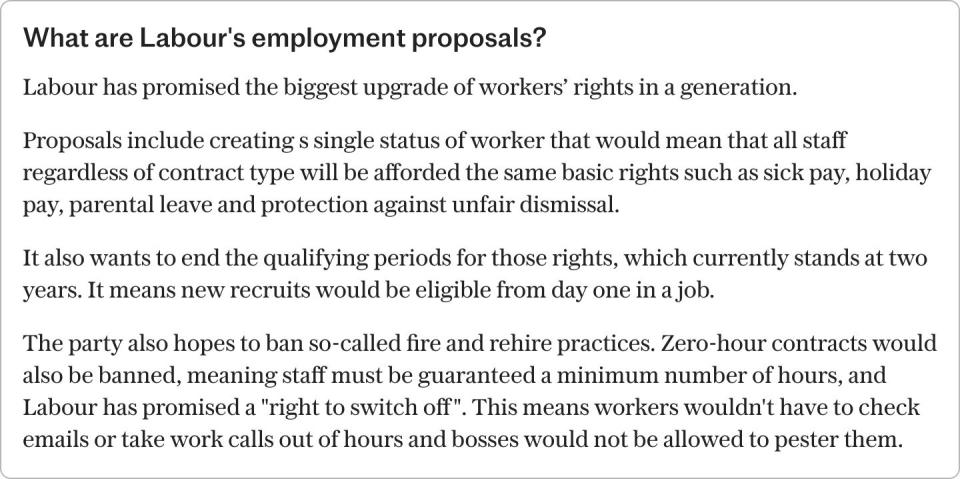
Nearly two-thirds of British businesses believe Labour’s reforms to workers’ rights will make the country a less attractive place to invest.
Proposals put forward by Angela Rayner will mean that employees will no longer have to wait two years until they qualify for full employment rights, but will instead be given immediate protection against unfair dismissal. The proposals are part of a package aimed at strengthening workers’ rights and “making work pay”.
However, the plans have alarmed company leaders, who fear they could face a wave of employment tribunals as a result of the changes. There is also confusion over how probationary periods will work under the new system. Many companies have said the plans will discourage them from taking on staff.
Matthew Percival of the Confederation of British Industry (CBI) said workers’ rights were the “biggest concern” among businesses on day one.
A survey of CBI members, which includes FTSE 100 giants AstraZeneca, Unilever and GSK, found that 62% predict a decline in the UK as an attractive place to invest and do business over the next five years.
Similar surveys among smaller companies have reflected similar anxiety.
Click here to view this content.
Mr Percival said there was concern that new recruits would not be given “a chance” if day one entitlements were too rigid.
He said: “I don’t find anyone telling me ‘we need two years’, but people get nervous when it comes to 12 months.”
He added: “The harsh reality is that businesses are already struggling to keep up with pressures on their bottom lines, especially SMEs, and that increased labour cost pressures will inhibit their ability to invest, hire and grow.
The CBI said the “top change in perceived future threats to competitiveness” was flexibility rules, which 58% of businesses believe will affect competitiveness over the next five years.
The government has proposed giving workers the right to request flexible working arrangements from day one and pushing for a four-day work week.
The flagship package of measures designed to boost employee rights also includes ending zero-hour contracts, banning “fire and rehire” practices and raising the minimum wage.
The CBI said only 26% of businesses are currently confident they can absorb the cost of the government’s schemes without a negative impact on growth, investment, employment or employee benefits.
Percival said the lack of detail on how the workers’ rights reforms would work had created “damaging uncertainty”.


Ms Rayner and Business Secretary Jonathan Reynolds met with industry leaders earlier this month to discuss the plans. Executives raised their concerns with ministers at the meeting.
This will be a crucial week for discussions on reforms as the government moves closer to introducing its labour rights bill next month, which it said it would do within its first 100 days of taking office.
A government spokesman said: “Our number one priority is economic growth and wealth creation, which is why our plan to improve workers’ rights is designed to help people get into secure work and lead to a more productive workforce.
“That’s why we work closely with businesses and civil society to find the balance between improving workers’ rights and supporting the great companies that pay people’s wages.”
Broaden your horizons with award-winning British journalism. Try The Telegraph free for 3 months with unlimited access to our award-winning website, exclusive app, money-saving offers and more.
#Twothirds #businesses #Labour #reforms #harm #British #competitiveness